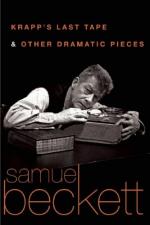|
This section contains 2,452 words (approx. 7 pages at 400 words per page) |

|
Oberg examines the nature of self in Beckett's play, delineating the similarities between Krapp's Last Tape and the works of Marcel Proust, a French author who greatly influenced the playwright.
Krapp's Last Tape opens on one man alone with his own memories and desires, punctuating a monotonous present by recall of a moment-lit past. As a writer and as a man lying "propped up in the dark," Beckett makes Krapp's associations with Proust even more pointedly prominent. The situation of Krapp stocktaking and listening to old stocktakings is dependent upon the catalysts of Time, Habit, and Memory, the trinity considered by Beckett in his 1931 study of Proust. Considerations that Krapp has made and will continue to make of his lifeintellectual, physical, spiritualare rendered rememberable, if not memorable, with the aid of dictionary and tapes. Krapp now is not Krapp past nor Krapp future. Like Proust...
|
This section contains 2,452 words (approx. 7 pages at 400 words per page) |

|




